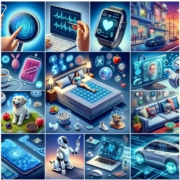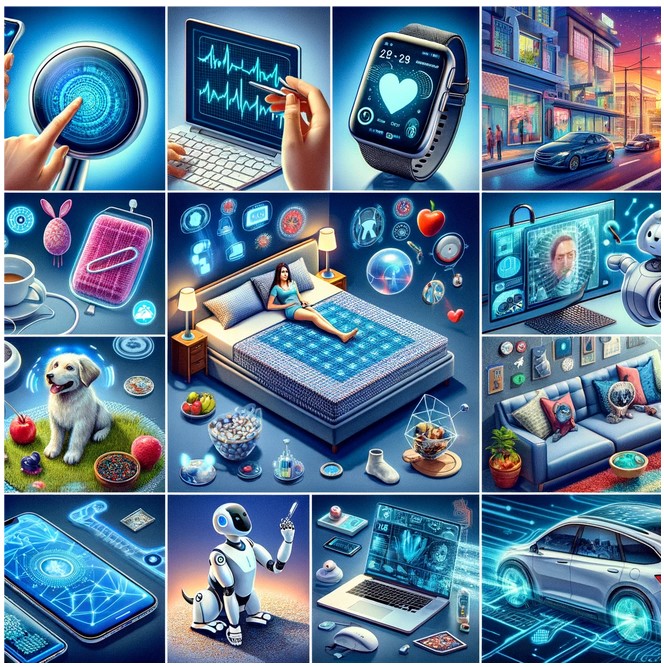SIRI, MEET YOUR COUSINS
(NURX), (IRTC), (BIO), (AAPL), (JNJ), (GOOGL), (HPQ), (INTC), (VERI), (QCOMM), (CHWY), (IRBT), (PETQ), (TSLA), (F), (GM)
At CES 2024, artificial intelligence (AI) was not just part of the buzz; it was the pulsating heart of the entire show.
This event wasn't your typical tech fest. It was like stepping into a future crafted by AI. The future looked so vivid and real that, even I, usually a skeptic, found myself drawn in.
Starting with NuraLogix's (NURX) Anura MagicMirror, which is no ordinary mirror.
Imagine a mirror that doesn't just reflect your image but also divulges your health secrets. This groundbreaking tech can analyze facial blood flow to check vitals like blood pressure and heart disease risk. Currently eyed for gyms and clinics, it signifies AI's expanding role in health diagnostics.
Needless to say, the potential here is staggering. The AI healthcare market is expected to reach $173.55 billion by 2029, growing at an annual rate of 40.2%.
The RPM segment, where MagicMirror could be a star, is looking at a neat $4.3 billion by 2027. The idea of a mirror giving you health updates in your home or a quick health check at an airport kiosk isn't just convenient; it's revolutionary.
In this burgeoning field, companies like Empatica Inc. are carving out a niche with wristbands and smartwatches that use AI to track everything from sleep to stress and medical conditions such as epilepsy.
iRhythm Technologies (IRTC) also steps up with their Zio Patch, an AI-enabled wearable patch for monitoring heart rhythms, while Bio-Rad Laboratories (BIO) brings clinical research and medical diagnostics into the future with AI-driven tools for analyzing physiological data.
Meanwhile, giants like Apple (AAPL) are integrating AI into their Watch Series for health monitoring, Johnson & Johnson (JNJ) is diving into AI for medical imaging and personalized medicine, and Alphabet Inc.'s (GOOGL) Google Health subsidiary Verily is pushing the boundaries with wearables and data analysis for disease detection.
From health, we drift into the world of sleep with China’s DeRucci's smart mattress and anti-snore pillow. This isn't just about sleeping well; it's about sleeping smart.
The mattress is embedded with 23 sensors that adapt to every little whim of your body – temperature, position, heart rate – ensuring optimal support.
And the pillow? It claims to reduce snoring by up to 89%. But good things come with a price – the pillow and mattress together could set you back about nine grand.
Yet, given that the global sleep tech market is a giant, estimated at $55 billion in 2023 and expected to balloon over $130 billion by 2030, DeRucci is onto something big.
The smart mattress sector is projected to hit $3.2 billion by 2026, and the anti-snoring device market is expected to reach $600 million by 2028. This is a market that's not just about comfort; it's about health and technology intertwining to improve quality of life.
From the bedroom, we move to personal computing with HP's (HPQ) Spectre x360 14. Here's where AI meets everyday technology, transforming our mundane tasks into something extraordinary.
Equipped with Intel's (INTC) latest processors, complete with a neural processing unit, this laptop is not just a gadget; it's a glimpse into the future of AI-infused computing.
Keep in mind that the AI consumer electronics market is huge. It's projected to reach $71.8 billion by 2027, growing at a strong 20.4% CAGR.
Within this, AI-driven laptops and PCs are set to grow at a dizzying 25.2% CAGR. HP, with its Spectre x360 14, is not just riding the wave; it's helping create it.
This fusion of AI into our everyday devices seamlessly bridges into another intriguing aspect of AI’s growing footprint: the entertainment industry. The intersection of AI and voice acting, highlighted by the SAG-AFTRA and Replica Studios agreement, brings a new dimension to AI's expanding influence.
This recent agreement is a milestone. It ensures voice actors are compensated for AI replicas of their voices in video games. It's a significant step in balancing technological advancement with performer rights.
Companies like Veritone (VERI), Resemble AI, and Super AI are leading this charge. Veritone is a titan in AI media, managing large-scale audio and video content across various sectors. Resemble AI is making strides with AI voice cloning and deepfakes, while Super AI is focused on emotional AI, striving to capture not just the sound but the essence of human speech.
This quest to humanize technology is a testament to how AI is not just imitating life but becoming an integral part of it.
Speaking of integration, let's pivot to Google's vision for AI in smartphones, echoed by giants like Apple and Samsung. It's not just about smart features; it's about transforming the core of how phones operate.
With powerful processors like Google's Tensor and Qualcomm's (QCOMM) Snapdragon 8 Gen 3, smartphones are evolving into something more powerful and intuitive.
The AI consumer electronics market predicted to exceed $150 billion by 2026, with smartphones as a driving force, is unassailable proof of the potential of Google's AI strategy.
But AI's influence doesn't stop at gadgets and health; it extends to our furry friends too. The Oro Dog Companion Robot is a perfect example of AI's foray into pet care.
Equipped with features like two-way audio, video, treat dispensers, and a ball thrower, it's designed to be a pet's new best friend.
The pet care industry is booming, expected to hit $305.1 billion by 2030, with smart pet products like the Oro Robot eyeing a $19.8 billion market by 2025. So far, companies like Chewy (CHWY), iRobot (IRBT), and PetIQ (PETQ) are key players in this emerging market.
Shifting gears from our furry friends to the automotive world, Volkswagen's integration of ChatGPT into its EV lineup marks a bold move in AI application in vehicles. This isn't just about adding a feature; it's about redefining the driving experience.
The global AI automotive market is estimated to reach $26.88 billion by 2027, with voice assistants, autonomous driving, and personalized experiences leading the charge. Aside from Volkswagen, Tesla (TSLA), Ford (F), and General Motors (GM) are already making significant strides in this field.
Overall, AI at CES 2024 was more than a series of exhibits; it was a vivid demonstration of how AI is reshaping our world – from health and pet care to smartphones and cars. As we stand at the threshold of this AI revolution, it's clear that we're just beginning to uncover its potential. The future is AI, and it's a future that's here to stay.




